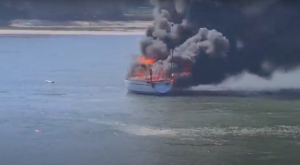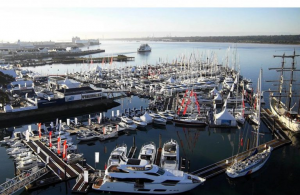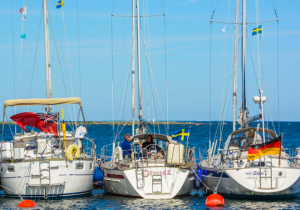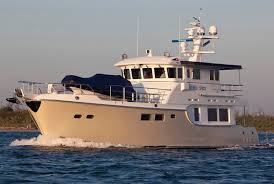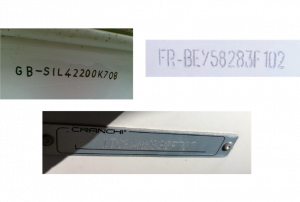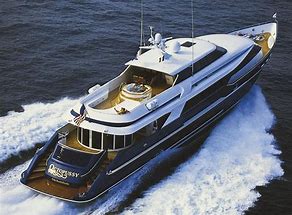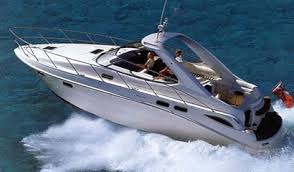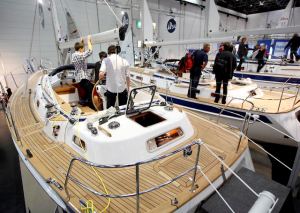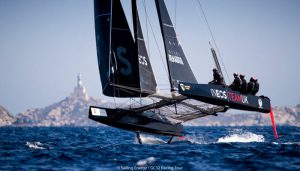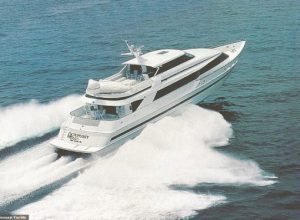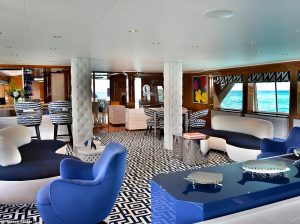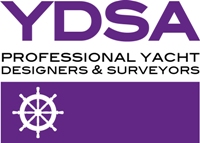Dramatic scene as fire-yacht carried to town quayApril 7, 2021
European Marine when undertaking Pre Purchase Surveys & Marine Surveys always check the fire extinguishers installed on all craft – We strongly recommend the installation of auto extinguishers in engine spaces
It is quite common to find that many many vessels have NO auto fire extinguishes permanently installed in their engine spaces etc. In fact in many small sail boats (per fire boat as below) it is necessary for a crew member to first locate an extinguisher (in the panic and heat of the moment) and then to open a small flap located in the engine hatch and insert the fire extinguisher nozzle and pull the trigger – in the event of a fire !
GRP burns very very quickly and first action must be the safety of life
Time is of Essence – It is not best practice and not recommended to attempt to extinguish as above – Fit Automatic Extinguishers
The cost of auto extinguishers is minimal (approx £50) when compared to the loss of human life
Four people including two children have been rescued from a burning yacht at Conwy Harbour.
The yacht crew had noticed smoke coming from the engine space hatch. After attempting to extinguish it using fire extinguishers, the fire escalated out of control.
The crew raised the alarm and were assisted off the vessel shortly after.
HM Coastguard says the crew managed to escape unharmed with the help of two other yachts in the area and are safe and well.
But, says the RNLI, there was an Easterly breeze, coupled with an incoming flood tide, which subsequently carried the yacht upriver, in the direction of the town quay. Conwy lifeboat stood by, monitored the situation and updated the UK Coastguard as appropriate.
Plumes of thick black smoke could be seen billowing into the sky.
With the fire well established, the vessel drifted onto a pontoon opposite the quay wall and was held against another smaller vessel which also caught fire. Given the billowing smoke, the decision was made to close off the quay.
The Harbour Office’s barge, under command of the Harbour Master, successfully assisted the fire service with transporting firefighters and equipment to help successfully extinguish the fire.
Unfortunately whilst the casualty vessel was being relocated towards the shoreside, it succumbed to its damage, and sank. The secondary yacht which had caught fire was successfully moved to the foreshore, so as to assist the fire service in ascertaining whether the fire was fully extinguished.
A spokesman for the HM Coastguard, told the Daily Post: “At 1.35pm we had a mayday call from a yacht called Osprey, who reported they were next to a yacht on fire.
“They were getting the people from their yacht onto their own and they were assisted by another yacht called Freedom in doing so.
“That was very quick and extremely brave of them – the vessel was quite significantly on fire when they made the call to us.
“They were all very lucky and I have to say my gratitude to those two yachts that rescued them so quickly.
“They really did make a positive contribution to the whole incident and did a sterling job.”
The Coastguard says after the alarm was raised, it broadcast to other vessels in the area to stay clear due to the “significant explosion risk.”

Land units from Llandundo and a lifeboat from Conwy were launched – primarily to work out where the drifting yacht was going to end up.
“In that part of the Conwy river, there’s a strong tidal current and because the tide was coming in, it was pushing the yacht up river, past the marina and down towards the bridge and the town,” the spokesman told the Daily Post.
“In the time it took for the yacht to get there, the gas cylinder did explode and launched itself quite high into the air, which was fairly alarming for everybody.
“But ultimately, because nobody was at risk, other than where this thing was going to land, we decided to let it get stuck somewhere and deal with it then, rather than try and catch it and become stuck to it when an explosion happened.”
Acknowledgement to Marine Industry News
For more information contact European Marine Services Ltd.
Marine Surveyors & Consultants | ADR Mediation | Expert Witness
www.europeanmarinesurveys.com
Tel: (44) 01603 327 123
British Marine – Leisure Reopening as from 8 MarchMarch 7, 2021
British Marine says it has met with the Department for Environment, Food and Rural Affairs to clarify the guidance specific to the leisure marine industry reopening from lockdown on 8 March.
It’s produced a matrix, which it says has been approved by government, detailing how British Marine members (England-only) should interpret the guidance.
Each step of the plan has a ‘no earlier than’ date, five weeks later than the previous step, to allow time to assess the impact of the previous step.
The organisation says it has clarified that, from 8 March, all forms of watersports, including the use of privately-owned craft and self-drive day hire boats for single households, can go ahead in England (subject to local navigation and harbour authority guidance). Furthermore, it has been concluded that marinas can open from 8 March to allow recreational boating to take place and boat brokerage can open in line with non-essential retail from 12 April.
This all assumes that boats allow for social distancing to take place.
The full matrix is split into seven categories: hotel boats, self drive day hire, self drive holiday hire, skippered boats, fixed trading boats, watersport activities, and private boats.

“This roadmap provides hope and reassurance, and I am pleased that the collaboration between government, other user groups and ourselves has resulted in aligned guidance for marine businesses and participants,” says Lesley Robinson, CEO of British Marine. “It is welcome news that parts of our industry should be able to re-open in time for the Easter holidays.
I am cautiously optimistic about the months ahead, based on the assumption that, as the vaccine rollout accelerates, the phased easing of restrictions is achievable.”
Guidance for Scotland, Wales and Northern Ireland differs. British Marine says it remains engaged with government on the individual plans set out by the devolved administrations.
Acknowledgement to Marine Industry News
For more information contact European Marine Services Ltd.
Marine Surveyors & Consultants | ADR Mediation | Expert Witness
www.europeanmarinesurveys.com
Tel: (44) 01603 327 123
Boat owners caught ‘in perfect storm’ says Cruising AssociationFebruary 10, 2021
Robin Baron, chairman of the Cruising Association’s RATS committee, says cruising yachtsmen are in the middle of ‘a perfect storm’.
His words come at the end of months of covid restrictions, a VAT ‘trap’ and new visa rules exacerbating everything. Amid a surge of enquiries about Brexit which has seen the CA run a seminar and respond to multiple questions from members in unfolding territory, Baron has settled on a plan to at least help members negotiate visa arrangements. He’s looking to exert pressure from within.
Since 1 Jan 2021, people can only stay 90 days in any 180-day period within the Schengen area (see below). The 180-day reference period is not fixed. It is a moving window, based on the approach of looking backwards at each day of the stay over the time period. Only absence for an uninterrupted period of 90 days allows for a new stay for up to 90 days.
“This simply doesn’t work for cruising yachts,” states Baron. “It cuts off either April and May, or August and September.” But what perplexes him is that while the UK government gave “EU citizens the right to visit for up to 180 days, our government declined to negotiate the reciprocal arrangement with Schengen.”
Baron admits that a few yachtsmen calling for extended visas or equal arrangements is probably quite low on the government’s priority list, but when added to the cacophony of noise being made by musicians and second home owners also pushing back against 90 days, he’s determined that any changes to be made include boat owners.
“My worry is that second home owners – who find themselves in the same position – will lobby successfully to have an extension, but the Cruising Association needs to make sure that any development includes people in boats and that a visa status change isn’t dependent on having a second address,” he says.
Inevitable consequences of Brexit
With the UK Government so committed to stopping freedom of movement of people, it seems no surprise that the EU’s Brexit negotiator Michel Barnier says the limited 90 / 180 visa result was one of the “inevitable consequences” of Brexit.
“I very much regretted that the British didn’t have more ambition for people’s mobility,” Barnier told reporters, specifically in reply to questions about musicians. That thwarted ambition is now trickling into everyone’s lives.
“From last March, we made fairly ambitious proposals in terms of mobility, including for specific categories such as journalists, performers, musicians and others,” he went on. “But you need to be two to make a deal.”
Now Baron is looking at ways of making a deal happen from within the EU, given the length of the UK Government’s priority list and where yacht owners are placed.
“We’ve selected countries and are working to create groundswell support to add pressure from within Schengen to allow UK yachts to visit for longer periods. We’re trying to raise localised support, from marinas and other marine trades in target countries like Spain, Portugal and Greece. We’re hoping they’ll help pressure their MPs to grant extended visas,” Baron says. “Our inland waterways section is seeking to negotiate with the Netherlands, using locals to provide influence, to try and gain extended visas.”
He recognises that this is a long-shot as “the economic picture of visiting UK yachtsmen doesn’t add up to a ton of money”, but cites Sweden’s extended visa as a good model to start with. According to Baron, several CA members are currently applying for a visa to see how the process works and identify any pinch points.
“We’ll try out the French system when that opens,” he says, “and we’re expecting the Greeks to move swiftly. Theirs is a small economy, but there are a lot of Brits with boats there.”
The VAT trap
But while Baron has a route forward – albeit lengthy – with attempts to influence visa changes, the perfect storm is raging. And Baron himself has been caught in a downpour, also known as the VAT trap.
Like thousands of other yacht owners, Baron has found himself in a dilemma. Bring his boat back to the UK and face VAT charges running into the thousands, or leave it where is it (in his case Denmark) and have cruising severely curtailed.
The problem arose from a statement made in spring 2019, when – as Baron explains – HMRC said if a boat owner paid VAT in the EU, it would be treated as if the VAT had been paid in the UK.
“Some people went to Europe and bought boats VAT paid thinking they could bring them to UK with no VAT owing,” says Baron, “as that’s what had been said.
“But in 2020, HMRC did a complete about turn. At the end of the sailing season it announced that if you’d bought a boat in the EU – and it had never been in the UK – and you bring it here, even for a day, you’ll be charged VAT.”
2021 is seen as a grace period for those who have had a boat under the same ownership in the UK and EU to get it back . . . but the boat must have visited UK waters already to be eligible, so that it’s classed as ‘returning’.
Freedom to make new rules
Baron says the ‘returned goods’ concept is a simple “cut and paste” from EU legislation which the UK Government has chosen to follow at a point when it had complete freedom to make new rules.
“It [government] didn‘t have to do it this way and most boat owners caught in the trap will simply not return their boats to the UK to the financial detriment of the UK marine industry,” he says.
While the CA’s members campaigned and lobbied their local MPs, the treasury reply was a “standard, bland response which doesn’t address the concerns of some people having to fork out substantial additional sums to bring their boat back to the UK.”
He’s less than sanguine about the government’s response.
“We’re still seeking a meeting with HMRC,” Baron says. “Brexit is down the list behind covid. The cabinet’s bandwidth is completely taken over by covid which is a much more serious problem than a few yachtsmen having to pay VAT.”
But even those who aren’t caught in the VAT trap and who can make use of the grace period are in trouble. “People with boats in the Eastern Med are ‘stuffed’,” says Baron. “Getting back with covid restrictions and the 90 days ruling may very well be difficult.”
Thousands of boaters struggling
He estimates that several thousand boaters are struggling in one or more of the storm’s pathways, but it’s hard to say definitively as he hears people’s anxieties due to restrictions, not their ‘real life experiences’. Baron’s expecting to hear more about that when covid eases and the next barrier to travel arises – insurance.
“Even if we gain an extended visa,” he says, “people will need evidence of health insurance and that will need to cover repatriation costs. That’s going to be another complication as insurance companies are reassessing everything in the light of covid . . . and lots of yacht owners are over 70.”
His final words of advice for any boat owner revolve around paperwork.
“Carry all the documents you can muster,” he says. “We don’t know what the entry requirements will be for each EU port. But I’m confident we’ll get it sorted out.”

Images courtesy of Cruising Association.
The 26 Schengen countries are Austria, Belgium, the Czech Republic, Denmark, Estonia, Finland, France, Germany, Greece, Hungary, Iceland, Italy, Latvia, Liechtenstein, Lithuania, Luxemburg, Malta, the Netherlands, Norway, Poland, Portugal, Slovakia, Slovenia, Spain, Sweden and Switzerland.
Acknowledgement to Marine Industry News
For more information contact European Marine Services Ltd.
Marine Surveyors & Consultants | ADR Mediation | Expert Witness
www.europeanmarinesurveys.com
Tel: (44) 01603 327 123
UK owners required to carry VAT documentation ‘at all times’ post BrexitDecember 21, 2020
In a recent notice published by HMRC – Notice 8: sailing your pleasure craft to and from the UK boat owners are being told to carry ‘documentary evidence supporting VAT status . . . at all times’. This is because, post-Brexit, owners ‘may be asked by customs officials to provide evidence of [a] vessel’s UK VAT status’.
The evidence suggested by HMRC includes an original invoice or receipt, to show that VAT was paid on purchase. If an owner built the boat themselves, they’ll need to have invoices for materials used in the construction to hand.
But, as one boat owner expressed to MIN: “Who has that? I have no idea where I’d find that.”
HMRC is keen to point out that a registration document on its own does not prove the UK VAT status of the vessel, as there is no link in the UK between the registry of the vessel and the payment of VAT.
The HMRC notice continues with advice for buying boats post-Brexit.
‘When buying a used pleasure craft from any VAT registered business in the UK, you should make sure that the invoice shows separately any VAT that the business has charged to you on the supply of the pleasure craft,’ says HMRC. ‘If you are buying from a business that does not charge VAT on the transaction or from a private individual in the UK and the seller states that UK VAT has previously been paid on the vessel, you should obtain evidence from the seller that VAT has previously been accounted for.’
The notice also covers customs requirements for leisure owners who sail their crafts to or from the UK.
It answers questions about flying the ‘Q’ flag, notifying National Yachtline and about which goods need to be declared including prohibited and restricted ‘foodstuffs’.
More information can be found in the notice or by contacting HMRC by email.
Acknowledgement to Marine Industry News
For more information contact European Marine Services Ltd.
Marine Surveyors & Consultants | ADR Mediation | Expert Witness
www.europeanmarinesurveys.com
Tel: (44) 01603 327 123
British Marine launches Manufacturer Identity Code online systemNovember 26, 2020
British Marine has released an online Manufacturer Identity Code (MIC) application and search system in preparation for the end of the Brexit transition period.
After 1 January 2021, all global boat builders, including EU-based manufacturers, will have to register their MIC on the UK register to place a vessel on the GB market.
As a requirement of the Recreational Craft Directive (RCD), a MIC code forms part of a unique serial number that every CE-marked boat must have and enables manufacturers and regulators to identify each particular vessel. It also helps others to identify the country of origin, the builder and year of build of the boat. On behalf of the leisure marine industry in the UK, British Marine is appointed by the government to administer the MIC code national register.
The online system will allow all global boatbuilders to continue to register their codes and is publicly accessible, assisting boat brokers, surveyors and second-hand boat buyers to confirm a vessel’s details.
Acknowledgement to Marine Industry News
For more information contact European Marine Services Ltd.
Marine Surveyors & Consultants | ADR Mediation | Expert Witness
www.europeanmarinesurveys.com
Tel: (44) 01603 327 123
Peters & May urge boat owners to think Brexit and VATNovember 23, 2020
Marine transport and logistics provider, Peters & May, is reminding UK boat owners with vessels outside the UK that, as the Brexit transition period comes to an end, the rules determining boats’ VAT status will be subject to change.
The latest information available from HMRC is that, from 1st January 2021, the rule that yachts must return to the UK within three years of having last left the UK/EU in order to be entitled to Returned Goods Relief (RGR) on duty and VAT will be strictly enforced.
“Whether RGR is applicable will be dependent on it not having undergone any repairs whilst outside the EU that increased its value when it last left the UK/EU and the amount of time it has been overseas, the date of its reimport into the UK and whether the place from where is it returning is inside the Customs Territory of the EU,” says Adam Towgood, sea freight and customs manager. “In order to claim the VAT relief element of RGR, it must also have not changed ownership since it last departed. Where a boat does not meet RGR criteria, duty and VAT will be payable to HMRC upon reimport.”
HMRC has recently announced the grant of a 12-month extension exclusively for boats that are currently within the EU, having departed the UK before 31st December 2017. These now have until 31st December 2021 to be reimported to the UK and claim RGR.
“To ensure that there is no VAT payable to HMRC on the reimportation of their boats we are urging UK boat owners to take early action. Owners need to be aware of the dates of their boats’ movements and time away from the UK and act accordingly to claim Returned Goods Relief,” says Towgood.
Peters & May says it has availability on sailing schedules from the Med which will arrive in the UK before the end of December 2020. The company says an integral part of its yacht transportation service is the completion of complicated paperwork on behalf of the owner.
Acknowledgement to Marine Industry News
For more information contact European Marine Services Ltd.
Marine Surveyors & Consultants | ADR Mediation | Expert Witness
www.europeanmarinesurveys.com
Tel: (44) 01603 327 123
Shadow 26 – Pre Purchase Survey, Testimonial # 01782September 25, 2020
Good morning Will,
Thank you for the report. As new boat owners we have read through this and most makes some sense to us but as requested we have passed it over to the sales manager at NYA to look at too. We will definitely ring you if we need any clarification etc, thank you for the offer.
We will send a cheque to you in today’s post.
Thanks again for your service, definitely worth using.
Regards
J H
For more information contact European Marine Services Ltd.
Marine Surveyors & Consultants | ADR Mediation | Expert Witness
www.europeanmarinesurveys.com
Tel: (44) 01603 327 123
Industry News – Windboats Marine in AdministrationMay 13, 2020
Sadly, we need to report the ‘Administration’ of one of Norfolk’s oldest and most respected boat builders Windboats Marine, being founded in 1920 in Wroxham.
Extract from Letter dated 1 May 2020 …
Statement by Administrators – ENSORS, Chartered Accountants, Cambridge
Windboats Marine Limited – In Administration (the Company)
” I am writing to advise you that along with my colleague David Scrivener, I was appointed Joint Administrator of the Company on 27 April 2020 and enclosed with this letter is formal notice of our appointment.
Please note that we are licensed to act as an Insolvency Practitioners by The Institute of Chartered Accountants in England & Wales and as such am bound by the Insolvency Code of Ethics when carrying out all professional work relating to an insolvency appointment.
The current position
The Company has currently ceased trading due to the restrictions of the Covid-19 Pandemic and lockdown but trading may commence in due course and in that event please note the requirements below in relation to existing and future orders.
Goods or services supplied to the Company after the date of my appointment must only be against orders which are signed by me or one of my authorised representatives, specimens of whose signatures appear below. Goods or services delivered against these orders will be paid for on normal trade terms unless otherwise agreed.
I am not necessarily adopting contracts entered into by the Company prior to my appointment and you must obtain my agreement that undelivered goods or services ordered before my appointment are still required before you deliver them. If they are required, then you should obtain a formal confirmation signed by the approved signatories specified above.
It should be noted that services provided and goods sold and delivered by the Company after my appointment must be paid for in full and no right of set off exists against any sums due to you by this Company prior to my appointment.”
For more information contact European Marine Services Ltd.
Marine Surveyors & Consultants | ADR Mediation | Expert Witness
www.europeanmarinesurveys.com
Tel: (44) 01603 327 123
Boating officially open says DEFRA
DEFRA has finally clarified some of the concerns about whether recreational boating was classed as permissible in England.
In an update to its website this morning, the Government department says:
“ All forms of water sports practiced on open waterways, including sailing, windsurfing, canoeing, rowing, kayaking, surfing, paddle-boarding and the use of privately-owned motorised craft (in line with the guidance issued by the relevant navigation authority) are allowed.”
The RYA is leading the charge in getting boaters back onto the water, also pushing for sailing clubs to reopen, citing Sports England‘s website’s statement that
“ Any facilities associated with outdoor sports and physical activities are permitted to re-open, including basketball and tennis courts, playing spaces like golf courses (public and private) and playing fields and water sports.”
Sarah Treseder, RYA Chief Executive, says: “ We welcome the Government’s guidance that general day trip leisure activities are being encouraged and we will continue to work with the RNLI to ensure this is done safely. “We know that many people will choose to participate in water-based activities such as sailing, motor boating, kayaking and angling from now onwards – especially given the longevity of the lockdown restrictions to date and the favourable weather conditions we’ve been enjoying. In line with Government guidelines for public spaces, the boating community may now drive to their destination so long as they observe social distancing.”
However, Richard Ballantyne, Chief Executive of British Ports Association, is advising caution.
“ We’re all keen and excited to get into the leisure season,” he says. “But we have to urge caution and temper expectations. There is still a question about landside interfaces – like slipways and marinas. These have been closed by various bodies and we’re waiting clarification which should come under policy set by the Departure for Culture, Media and Sport. What we really need is a bit of clarity today.
“ There’s been lots of workplace guidance which covers warehousing and shops, but there isn’t any specific mention of marine facilities in there.
“ Even if we had everything through this morning, some of the ports would potentially need some time to carry out risk assessments and analyse and modify facilities. And although ports have been looking at this since Monday, that may be too short a time to get ready. A lot of smaller ports have furloughed staff and they’ll need time to get them back. They may need training on new ways of working. ”
Cowes Harbour Commission (CHC) issued a statement pointing out that the Government has not yet issued any specific guidance on leisure marine activities and a number of important issues surrounding the potential reopening of marinas, slipways, pontoons, etc., and access to leisure vessels still requires urgent clarification.
“ Although it is expected that specific Government advice will confirm that certain sailing activities and water sports will be able to start shortly,” the statement reads [this has now been confirmed], “marine leisure facilities around the country will need to be assessed and prepared to accommodate social distancing and hygiene measures.”
The British Ports Association (BPA) and UK Harbour Master’s Association (UKHMA) have been in daily contact with relevant Government departments and are assured that further guidance is expected to be released shortly. The more general Transport Sector guidance released yesterday makes it clear that organisations are expected to consider it in full and translate its principles and examples into specific actions.
To comply with their legal Health and Safety obligations, organisations also need to ensure that risk assessments (which take account of relevant guidance) have been carried out and suitable policies and procedures put in place. To do this properly and safely takes time, to ensure safety for users, staff and also the public. This also means that there are likely to be certain measures that need to be followed that could alter what leisure users can do.
“ The BPA and UKHMA have therefore suggested that Cowes Harbour Commission considers waiting for the more specific guidance to be issued before easing current restrictions,” the CHC statement says.
“ The intervening period can be used to consider the newly released Transport Sector guidance and to prepare the relevant policies and procedures. These can then be adapted following the release of the more specific guidance
“ For the safety of everyone, recreational marine leisure users are asked to remain patient and understanding as the BPA and UKHMA continue to cooperate and work closely with Government.”
Martin Willis, Executive Officer of UKHMA, says: “ The Government’s maritime focus rightly has up to now been on the ferries, cargo, shipping and passenger sectors. We knew that the leisure and recreational sector would be challenging as lockdown restrictions begin to be lifted – events on the ground are currently outstripping official communication and planning.
“ There seems to be a real mixture of response from ports, harbours and marinas around the UK following the Prime Minister’s statement at the weekend,” he says. “It’s really up to the individual harbour authority or marina facility to do what’s best to manage the risk level regarding their operations, their stakeholders and the public based on the latest Government guidance regarding social distancing and safe operating measures.
“ There will be a mixture of very proactive ports who are ready, and some who are a bit slower due to individual operational circumstances. It feels like there is lots of pressure to open up around the Solent, less possibly elsewhere in areas of the UK.
“ People do need to take the time to get back to their vessels to check on the safe condition of the craft and their equipment, making sure all their equipment is in date and ready to use as necessary, to avoid placing undue burden on the RNLI and other rescue services.”
In Portsmouth, the Queen’s Harbour Master had this to say:
“ Following the Government’s revised social distancing measures aimed at reducing the spread of the COVID-19 coronavirus, we are continuing to review our advice to recreational boaters in concert with industry bodies and the regional ports and harbours. Further clarity is currently being sought from the Department for Culture, Media and Sport who are setting details of how facility operators and water users will be required to comply, and our advice will be updated in line with this guidance.
“ In the meantime, QHM Portsmouth continues to operate an open port policy, the primary purpose of which is to protect defence output and commercial activity including vital transport, trade routes, and industry.
“ Some leisure facility providers within the Dockyard Port are considering the feasibility of re-opening while addressing how to manage constraints which may be imposed to meet the Government’s requirements.
“ Individuals whose circumstances permit them access to the water are encouraged to consider the following:
- Whether your activity is being carried out in conformance with Government regulations for social distancing and exercise, including on the shore when accessing the water
- Whether sufficient maintenance has been conducted on your vessel to ensure it remains serviceable and seaworthy, reducing the risk of needing external assistance
- Any other aspects which increase the risk of depending on emergency responders including experience levels and prevailing conditions.
“ The fact that at present there are no RNLI lifeguards on beaches, no Volunteer Harbour Patrol in Portsmouth Harbour, and although volunteer lifeboat crews are fully operational should they be needed, it is important that anyone visiting the coast understands the risk and takes the necessary steps to keep themselves safe. ”
Acknowledgement to Marine Industry News
For more information contact European Marine Services Ltd.
Marine Surveyors & Consultants | ADR Mediation | Expert Witness
www.europeanmarinesurveys.com
Tel: (44) 01603 327 123
‘Octopussy’ – The Superyacht that couldn’t be builtApril 29, 2020
When American entrepreneur, John Staluppi, decided in the early 1980s that he wanted the fastest superyacht in the world – one that could break the 50 knot (57.5mph) barrier – every boatyard told him it couldn’t be done. Every boatyard except Heesen Yachts in the Netherlands.
It rose to the challenge in spectacular style, delivering Octopussy in 1988 – a boat the size of a small house that was actually capable of a world-record-beating 53.17 knots (61mph). And now a new documentary has revealed the fascinating story behind this remarkable feat of engineering, according to the Daily Mail.
Called Octopussy: The Yacht That Could Not Be Built, it tells how Staluppi, after investigating the highest horsepower engines available, took the unprecedented step of buying three immensely powerful MTU power units and went looking for a naval architect to design a boat around them. But it was an order too tall for everyone he approached.
He says in the documentary: “I could never have the biggest yacht in the world, but I knew that I could have the fastest yacht in the world. [But] some people [I approached] would look at it and go back to engineering departments then come back and say ‘it’s impossible’.”
However, Frank Mulder of Mulder Design, a skilled naval architect from the Netherlands, after six weeks of calculations, said the project was possible.
Staluppi continues: “Mulder said that he only knew one shipyard that might take the challenge. And that’s how we got started with Frans Heesen, who was supposed to be the best.”
Staluppi continues: “Mulder said that he only knew one shipyard that might take the challenge. And that’s how we got started with Frans Heesen, who was supposed to be the best.”
Shortly after, in a meeting in Fort Lauderdale, Heesen accepted Staluppi’s challenge to build the fastest superyacht in the world.
In an age before computers, he was the first to say that ‘if he [Mulder] comes up with the right drawings and calculations… then I will build you this boat’.
The documentary reveals that Heesen was so supremely confident in his team’s engineering and craftsmanship, he even agreed to a legally binding penalty clause in the contract that if Octopussy did not reach 48 knots (55mph) at launch, Staluppi would not have to take the boat or pay for the cost.
In addition, for every knot under 50 that the top speed equalled, the shipyard would have to pay Staluppi $100,000 (£80,000). That’s the equivalent of $200,000 (£160,000) in today’s money.
However, for every knot over 50, Heesen Yachts would receive a $200,000 bonus ($430k/£345k in today’s money).
Staluppi says: “It was a risky challenge for a shipyard – if it went under 48 knots, I didn’t have to take the boat and they’d give me all my money back.
“So, I bought a radar gun. And he [Frans Heesen] said ‘OK, we can do it’.”
Financially the yard could not survive such a loss, but the documentary shows that with the international press following Staluppi’s every move, an ambitious Heesen decided to risk the entire future of the company for the opportunity to put the shipyard’s name on the global stage.
From then, each decision, from the water jets specified to the appliances that Staluppi’s wife, Jeanette, chose were defined by weight.
All parties worked around the clock to ensure the boat was as light as possible to facilitate hitting the 50knot goal.
When it was launched in April 1988, Octopussy not only looked sleeker than any other yacht at the time with its futuristic design, but exceeded all expectations with its astounding top speed of 53.17 knots (61mph).
The gamble had paid off. Staluppi realised his dream and Heesen Yachts became an international sensation.
In 2015, Octopussy underwent a refit with the length extended to 44m (144ft), while New York designer, Jeff Lincoln, updated its interior in a manner which no Bond villain, ever, could bear to be seen in.
Acknowledgement to Marine Industry News
For more information contact European Marine Services Ltd.
Marine Surveyors & Consultants | ADR Mediation | Expert Witness
www.europeanmarinesurveys.com
Tel: (44) 01603 327 123



